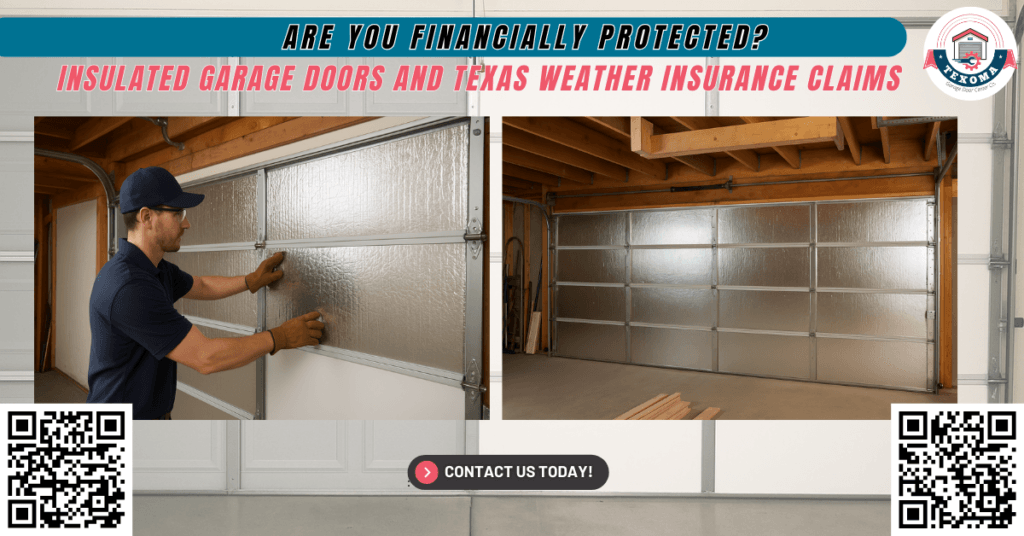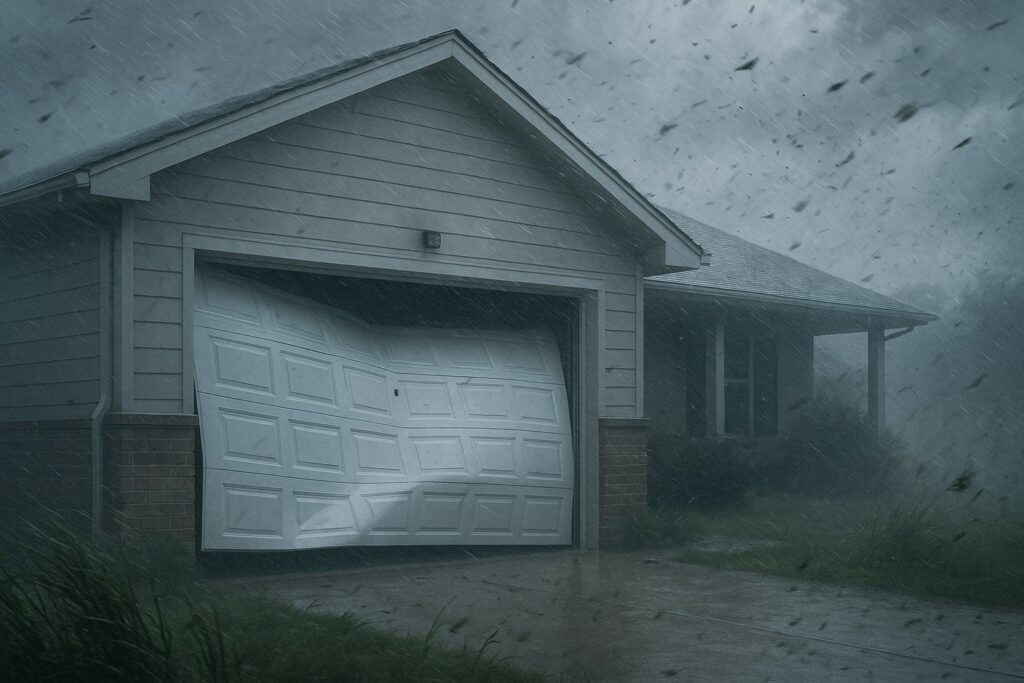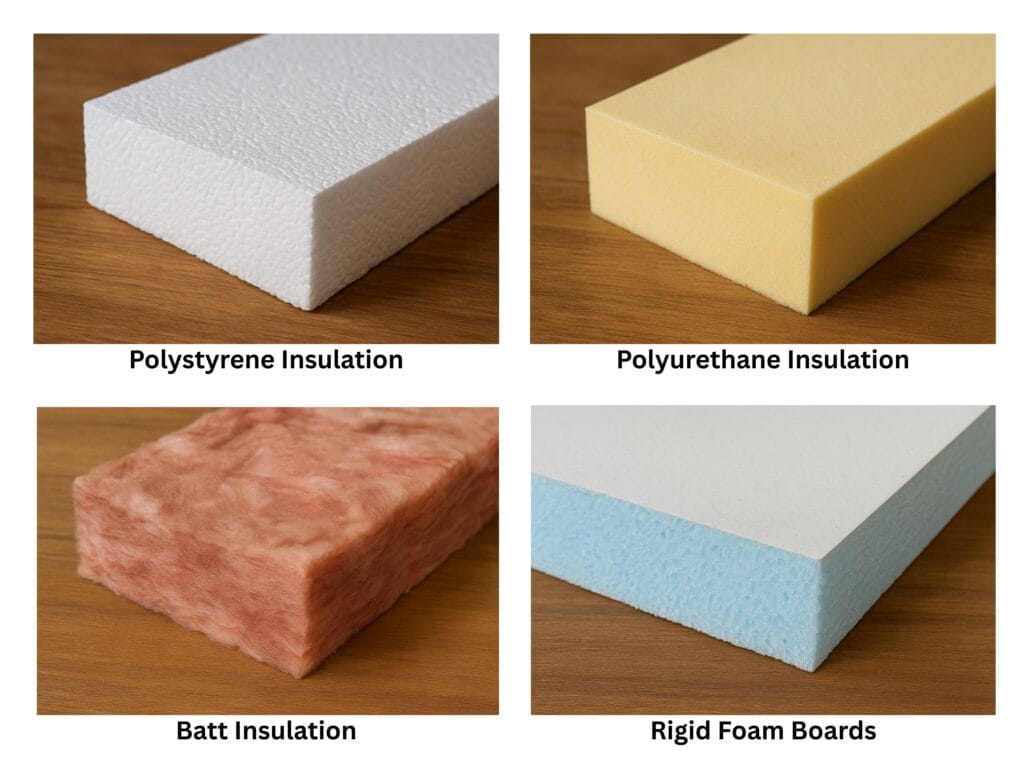Are You Financially Protected? Insulated Garage Doors and Texas Weather Insurance Claims

Earlier this spring, a homeowner in Sherman contacted Texoma Garage Door Center Co. after a major windstorm damaged their aging garage door. The original door was a non-insulated single-panel unit, installed over a decade ago, with no foam core or reinforcement. When filing an insurance claim, they discovered their policy wouldn’t fully cover the damage because the door didn’t meet current wind-load or insulation standards. We replaced it with a modern, multi-layer insulated garage door featuring polyurethane insulation, a durable steel exterior, and an energy-efficient design. With this upgrade, the homeowner not only improved their home’s safety but also gained stronger future insurance protection.
Statistics show that in Texas, over 40% of homeowners’ insurance claims are related to weather damage, especially wind, hail, and heat-related wear. Your garage door is more than just a large entrance to your home; it’s a critical barrier that protects your property from temperature extremes, wind pressure, and moisture infiltration. However, if that barrier is old, thin, or uninsulated, it may not hold up under stress, and insurers may not pay for the damage.
Choosing a new insulated garage door is more than a cosmetic upgrade; it’s a proactive investment in your home’s weather resilience, energy efficiency, and financial protection. Let’s explore why this matters, what you should know before filing a claim, and how the right garage door insulation can go a long way in protecting your home and budget.
Why Texas Weather Demands Stronger Garage Door Protection
In Sherman, TX, we experience just about every type of weather: scorching summers, sudden cold snaps in winter, gusty winds, heavy rains, and hailstorms. These weather extremes create serious pressure on your home’s structural systems, especially your garage and its door. Because it’s the largest opening in your home, your garage door can become a major vulnerability during storms.

Without proper insulation materials and structural reinforcement, non-insulated or outdated doors are more likely to:
- Buckle under pressure from wind loads
- Allow water, dirt, and debris to enter
- Transfer excessive heat into your garage and home
- Causes energy loss and increased utility bills
- Void or reduce insurance payouts due to non-compliance
By contrast, a high-quality insulated door, especially one made from steel, fiberglass, or aluminum panels with injected urethane foam, offers a significantly stronger barrier. These doors are tested to meet wind-resistance requirements, thermal transfer standards, and u-value benchmarks, making them more eligible for favorable insurance claims.
Modern insulated garage doors, including products from Clopay Garage Doors, Amarr Garage Doors, and Martin Garage Doors, come in various types like sectional doors, carriage house styles, and craftsman garage doors, all designed to enhance both form and function.
How Insurance Companies Evaluate Garage Door Claims
When severe weather damages your home, one of the first areas inspectors check is the garage door. Insurance companies now consider more factors than just visible damage; they evaluate whether your garage door met local building codes, contained appropriate insulation materials, and was installed by a certified professional.
Key Evaluation Factors:
- Wind Load Certification: Your door must meet wind-code requirements for your region.
Insulation Type and R-Value: A higher R-value (thermal resistance) indicates better heat insulation and weather performance. - Door Materials: Steel, fiberglass, and aluminum doors with foam core insulation resist damage better than older wooden or single-layer doors.
- Installation Records: Was your garage door installed by a licensed company? DIY installations may not meet code.
- Garage Door Opener Compatibility: An energy-efficient insulated door should operate seamlessly with garage door openers, such as Chamberlain garage door models with smart logic boards.
If your insulated garage door was professionally installed, documented, and compliant with wind and insulation codes, your chances of receiving full compensation improve significantly. If your door is outdated or non-compliant, your insurance provider may reduce coverage or deny your claim altogether.
What Is an Insulated Garage Door and Why Does It Matter?
An insulated garage door is more than just a thicker version of a traditional door. It’s built with multiple layers of material, typically steel, fiberglass, or aluminum, filled with rigid foam insulation such as polyurethane or polystyrene. These layers form a composite panel that resists temperature transfer, wind damage, and noise.
Common Insulation Materials and Types:
- Polyurethane Foam – A premium insulation material known for high R-values, exceptional strength, and low u-values (better energy efficiency).
- Polystyrene Panels – Cost-effective, lightweight foam panels ideal for mid-level insulation.
- Rigid Foam Board – Offers thick insulation and high compressive strength.
Batt Insulation Kits – Often found in DIY insulation kits, suitable for retrofitting older doors, though less effective than integrated insulation.

Benefits of Insulated Doors:
- Energy Efficiency: Keeps your garage temperature stable, especially if your garage space is attached to your home.
- Noise Reduction: Minimizes external noise and makes the door operation quieter.
- Weather Resistance: Stronger barrier against thermal transfer, wind, and moisture.
- Durability: Resists warping, denting, and rust, extending the lifespan of your garage door.
Whether you’re purchasing a new garage door or upgrading an older one, it’s vital to consider not just the initial cost but the long-term energy savings, insurance benefits, and return on investment.
Real Savings: How an Insulated Door Can Protect Your Wallet
Choosing an insulated garage door can result in significant cost savings over time. Though the initial cost is higher than a basic model, the benefits far outweigh the upfront expense.
Financial Advantages:
- Lower Energy Bills: High R-value doors reduce energy loss, especially in garages with shared walls, saving up to 15% in energy costs annually.
- Insurance Premium Discounts: Some insurers offer reduced premiums for homes with storm-rated or wind-resistant doors.
- Better Insurance Payouts: A properly insulated, code-compliant door improves your chances of full coverage in the event of weather-related damage.
- Maintenance Savings: Insulated doors are more durable, reducing long-term repair costs caused by weather damage, panel dents, or opener strain.
- Increased Home Value: Upgrading to a modern insulated garage door boosts curb appeal and market value.
By reducing thermal transfer and standing up to extreme weather conditions, these doors are a wise investment in the protection, performance, and comfort of your home.
What to Ask Before Filing a Garage Door Insurance Claim
If your garage door has been damaged by a storm or natural event, having the right information can help secure your insurance claim. Here’s a step-by-step guide to get started:
- What type of garage door do you currently have? (Is it insulated? Multi-layer? Does it have a foam core?)
- Do you know the R-value and material type? (Steel, fiberglass, or aluminum with polyurethane or polystyrene?)
- Was it installed by a licensed technician? (Having documentation helps.)
- Does it meet local building and wind-load codes? (Check with your installer or manufacturer.)
- Do you have pictures or receipts from before the damage occurred?
If your answers reveal an older, non-insulated door, this might be the right time to consider upgrading before the next storm rolls through. Taking proactive steps now can improve both your protection and your financial security.
How Can Texoma Garage Door Center Co. Help You?
At Texoma Garage Door Center Co., we specialize in helping Texas homeowners choose the right garage door for performance, safety, and insurance protection. Whether you’re dealing with weather damage or simply planning, we offer a wide range of solutions tailored to your needs.
Here’s how we support you every step of the way:
✅ Professional Installations: Our team ensures your insulated garage door meets local codes for wind resistance, energy efficiency, and thermal insulation.
✅ Custom Insulated Solutions: Choose from steel, fiberglass, or aluminum garage doors featuring polyurethane or polystyrene foam for top-notch insulation and R-values.
✅ Insurance Documentation: We provide receipts, product specs, and installation records to support your insurance claim and warranty coverage.
✅ Wide Range of Brands: We carry top-rated products like Clopay Garage Doors, Amarr, Chamberlain, and Martin Garage Doors.
✅ Garage Door Openers & Accessories: We install openers with modern logic boards, motion sensors, and compatible light socket features.
✅ Energy Savings Consultation: We’ll help you select a product that maximizes energy efficiency, reduces energy bills, and boosts insulating performance.
📍 Visit us: 1733 Texoma Pkwy, Sherman, TX 75090
📞 Call now: (430) 255-5451
💻 Or schedule your free consultation online!
Protect your home, save money, and gain peace of mind with a new insulated garage door from Texoma Garage Door Center Co. We’ll guide you every step of the way from selection to installation to insurance support.
Frequently Asked Questions (FAQs)
1. Does homeowners’ insurance ever fully cover garage door replacement after a storm?
Yes, but only if the door meets current code requirements and the damage is directly caused by a covered event like wind, hail, or fire.
2. Can I reinforce my existing non-insulated garage door to meet storm standards?
In some cases, yes, you can add retrofit bracing kits, but this may not provide the same protection or insurance eligibility as a new insulated garage door.
3. Do insulated garage doors make a noticeable difference in summer and winter temperatures?
Absolutely—insulated doors significantly reduce heat transfer in the summer and help retain warmth during the winter, especially in attached garages.
4. How do I find out the wind-load rating or R-value of my current garage door?
Check the manufacturer’s label on the interior side of the door or contact the installer; if unavailable, a professional inspection can determine these details.
